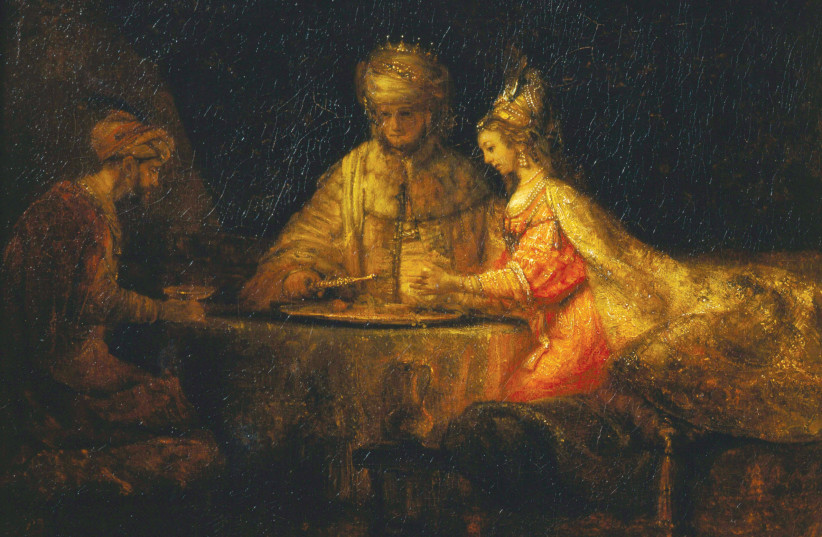Purim: Shushan and the modern city of rage

Civil politics have been replaced by toxic politics of anger and retaliation. Why are we always so angry? Tragically, we think that we are angry heroes, but in truth, we are all just foolish comedians
The saga of Esther and the Jews of Shushan is draped in gripping drama and in swirling palace intrigue. Former queens are deposed, and newly minted ones are crowned. Mid-level bureaucrats are hanged, while royal advisers are promoted to viceroys. Nothing is stable in the political quicksand of Shushan. Here today, gone tomorrow.
The saga is also flooded with powerful and radical emotional swings. The story commences with a half-year-long celebration in the city that never sleeps. Widespread pleasure and delight are quickly replaced by awful terror as the Jews learn of the vicious decree and their dreadful fate.
Three suspenseful days of pious fasting and fervent prayer trigger a miraculous and sudden turnaround. Within days, our enemies are subdued and Shushan shifts from sorrow into celebration and festivity. The emotional revolutions of this story are acute and extreme.
Purim story: Acting foolishly amid an emotional storm
Unexpectedly, within this emotional storm, the main characters, many of them wise, appear to act foolishly. Clever leaders succumb to folly, suffering self-inflicted wounds. King Ahasuerus hastily executes his recalcitrant wife but soon reminisces about his love for her. Had he responded more cautiously to the marital crisis, his beloved wife would still be sitting alongside his throne.
Plunged into loneliness, he conducts a nationwide search for a replacement queen. Had he just thought twice before pulling the trigger on his wife’s execution, he would have been less lonely and less desperate.
Haman, the king’s shrewd adviser, can’t seem to get out of his own way. Astonishingly, he constructs the very gallows which will one day snap his own neck. Foolishly, he intrudes into the king’s nighttime chambers, inciting against Mordecai, but in reality trapping himself in his own lair.
Two days later, he rushes headlong into a private royal party that will launch his own execution. The pace of Shushan is maddening, everyone is in a rush, and wise men behave like fools. In this Shakespearean comedy, folly replaces discretion, and careless decisions sink the best-laid plans of man.
The recklessness of Shushan is driven by rage and anger. Fury clouds our better reason and upends balanced decision-making. Infuriated by his wife’s insubordination, Ahasuerus hurriedly executes her without fully calculating the outcome. Enraged at the sight of a single defiant Jew who refused to bow to him, Haman devises a full-scale genocide to avenge his affront.
Upon encountering Mordecai’s insolence a second time, he effectively hangs his own neck. Finally, Ahasuerus is thrown into a fit of rage when he perceives Haman molesting Esther, and he rapidly slays his own trusted adviser.
Anger and rage hurl the main characters into foolish acts of self-destruction. Driven to anger, everyone has gone mad.
Why are we always so angry?
SHUSHAN IS still alive. We inhabit the modern version of that ancient city of anger. We wrestle with road rage, workplace rage and hostile communication. Civil politics have been replaced by toxic politics of anger and retaliation. Why are we always so angry?
Haman was a descendant of Esau, who resented his younger brother for usurping his natural title of firstborn. Resentment ran deep in his bloodlines and justified any retaliatory response, including genocide. Haman came from a long line of angry people.
Feeling aggrieved, we become indignant, angered and self-righteously justify moral violations. Perceived victimhood enrages us, paving the way for moral crimes committed in the name of retribution.
A year ago, a madman in Russia launched a vicious attack against a peaceful country because he felt aggrieved. The “unfortunate” collapse of the Soviet Union stripped his country of its natural empire, and to him the reversal of this injustice justifies the mass murder of innocent civilians and potentially the wreckage of his own country. Grievance muddies reason.
Democratic societies are becoming poisoned by the politics of grievance. Democracy raises great expectations which, when unfulfilled, breed frustration and anger. Feeling victimized by a lack of political influence, opposition parties and electorates become angry and disenfranchised. When those aggrieved parties regain power, they descend into retaliatory politics. Life, liberty and the pursuit of anger are the new inalienable rights of every citizen in the modern city of rage.
Life moves faster than ever before, and we are all expected to be online, all the time. The endless time demands of modern society leave us with little free time for repose and relaxation, and we are left with brittle patience. Living under intense time pressures, we become irritable and impatient when our time is taken either by others or by circumstance.
How technology has given us more problems, and the AI storm is coming
Ironically, technology and mechanization were meant to provide us with more time, more leisure, more space and greater emotional equanimity. Spared of manual labor, we were meant to lead more balanced and thoughtful lives. Sadly, we are haunted by a productivity paradox in which the introduction of technology has not necessarily boosted our productivity. We have less time available, live with less patience, and are less tolerant of encroachment on our time or space.
It is about to get worse. There is a storm brewing, and it is called artificial intelligence, or AI.
Artificial intelligence will cause a seismic shift in our work culture and in our general society. Will the availability of automated intelligence lighten our workload, alleviate our stress, and afford us more time for human wisdom and interpersonal relationships? Or will we continue to spiral into a free fall of stress and a diminishing of time availability?
Before eating from the tree of knowledge, Adam and Eve lived a blissful and quiet life of innocence and serenity. By eating the forbidden fruit, they acquired more knowledge, thereby wrecking their world and ruining human history.
Are we about to take a bite from the modern tree of knowledge called AI? How will it affect us? Unfortunately, we won’t know the answer until we taste the fruit. One thing is certain – our world will never be the same. There is no turning back, and this storm will wash away much of the old order.
No checks and balances against unconstrained anger
THE RECKLESSNESS in Shushan is even more stunning because there are no checks and balances against unconstrained anger. Family relationships in Shushan are hierarchical and paternalistic, leaving little room for women to moderate the behavior of their male masters.
At the outset, the king’s advisory board launches a chauvinistic power grab, assigning husbands as the “king of the castle,” while consigning women to manual labor and obedient submission. Vashti’s interests are irrelevant to the drunk revelers at the king’s bash. Voicing her own independent will, she is quickly liquidated.
Queen Esther fares no better, as she must solicit her husband for an audience; and even when finally granted an appointment, she must enchant him with her charm and beauty instead of simply requesting a favor. Unsurprisingly, Shushan, the den of sexual exploitation, doesn’t promote healthy marriages.
Haman’s wife Zeresh feels like a cardboard cutout rather than an actual human being. As her husband’s murderous plans develop, she riles his anger rather than questioning his motives or conscience. When her husband begins to falter, she ominously warns him of the impending disaster rather than help him reverse course.
At no point do any of the men receive stable or steadying input from their spouses or children. Without any checks and balances, the wheels quickly fall off and unchecked anger derails any and every agenda. Everyone in Shushan is angry... and alone.
We have more stress in our world and fewer tools for managing or handling it. Family life is fraying, depriving us of the comfort and solace that the home should provide. Homes should be peaceful zones that soothe stress and douse anger. Sadly, they often induce stress and frustration. There’s too much grievance, too much stress, too little time and weakened family support.
Tragically, we think that we are angry heroes, but in truth we are all just foolish comedians. ■
The writer is a rabbi at Yeshivat Har Etzion/Gush, a hesder yeshiva. He has smicha and a BA in computer science from Yeshiva University, as well as a master’s degree in English literature from the City University of New York.
Jerusalem Post Store
`; document.getElementById("linkPremium").innerHTML = cont; var divWithLink = document.getElementById("premium-link"); if (divWithLink !== null && divWithLink !== 'undefined') { divWithLink.style.border = "solid 1px #cb0f3e"; divWithLink.style.textAlign = "center"; divWithLink.style.marginBottom = "15px"; divWithLink.style.marginTop = "15px"; divWithLink.style.width = "100%"; divWithLink.style.backgroundColor = "#122952"; divWithLink.style.color = "#ffffff"; divWithLink.style.lineHeight = "1.5"; } } (function (v, i) { });


